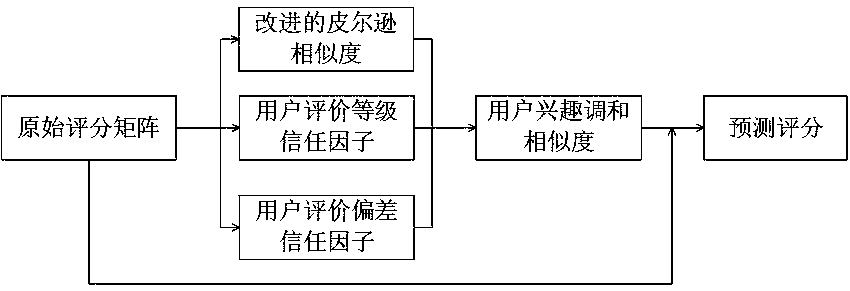Collaborative filtering method for user interest harmony similarity
A user-oriented, collaborative filtering technology, applied in special data processing applications, instruments, electronic digital data processing, etc., can solve problems such as low recommendation accuracy, insufficient timeliness, and inability to respond to changes in user interests in a timely manner
- Summary
- Abstract
- Description
- Claims
- Application Information
AI Technical Summary
Problems solved by technology
Method used
Image
Examples
Embodiment Construction
[0014] Such as figure 1 Shown is the collaborative filtering method of user interest reconciliation similarity, including the following steps:
[0015] (1) Use the user rating data to obtain the original rating matrix R and perform probability matrix decomposition on it to obtain an approximate rating matrix ;
[0016] (2) Traverse the original scoring matrix R and the approximate scoring matrix Get Pearson similarity based on user common interest score Sim fill_t_peirson ;
[0017] (3) Traversing the original rating matrix R to get the user rating trust factor N i ;
[0018] (4) Traverse the original rating matrix R to get the user evaluation deviation trust factor D i ;
[0019] (5) Utilize the modified user interest similarity sim fill_t_pearson , user evaluation rating trust factor N i and user evaluation deviation trust factor D i , calculate the user interest harmonic similarity sim t ;
[0020] (6) Calculate the recommendation result by using the o...
PUM
 Login to View More
Login to View More Abstract
Description
Claims
Application Information
 Login to View More
Login to View More - R&D Engineer
- R&D Manager
- IP Professional
- Industry Leading Data Capabilities
- Powerful AI technology
- Patent DNA Extraction
Browse by: Latest US Patents, China's latest patents, Technical Efficacy Thesaurus, Application Domain, Technology Topic, Popular Technical Reports.
© 2024 PatSnap. All rights reserved.Legal|Privacy policy|Modern Slavery Act Transparency Statement|Sitemap|About US| Contact US: help@patsnap.com










